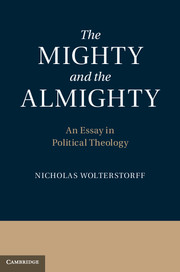This is the second in a series of posts on Professor Nicholas Wolterstorff’s book, The Mighty and the Almighty: An Essay in Political Theology. In the first post, I described what might be meant, and what Wolterstorff means, by “political theology,” and Wolterstorff’s project to arrive at a distinctly Christian political theology. Here I want to lay out the core thesis of that political theology.
The Mighty and the Almighty: An Essay in Political Theology. In the first post, I described what might be meant, and what Wolterstorff means, by “political theology,” and Wolterstorff’s project to arrive at a distinctly Christian political theology. Here I want to lay out the core thesis of that political theology.
That thesis can be summed up in the phrase, “dual authorities.” Christians, Wolterstorff writes, are subject to the dual authority of Christ and the civil power. And these dual authorities mediate one another.
These are deep waters and Wolterstorff explains and helps the reader by considering an ancient example–that of Polycarp, Bishop of Smyrna, who was martyred in 156 A.D. Polycarp is sought out, arrested, and haled into a stadium filled with people where he is urged by the Roman proconsul to renounce Christ and swear by the genius of Caesar in order to save himself from execution. Polycarp refuses in these words: “For eighty and six years have I been his servant, and he has done me no wrong; how can I blaspheme my King, who has saved me?” Later in the exchange, Polycarp tells the proconsul: “[W]e [Christians] have been taught to render honour, as is meet, if it hurts us not, to princes and authorities appointed by God.”
Wolterstorff’s thesis depends on a close reading and interpretation of these statements. Unlike those who resist government’s coercive power as having no authority at all over them, “Polycarp’s resistance was different”:
He did not declare that obeying his own interior conscience had higher priority for him than obeying the proconsul. He did not declare that loyalty to his group had higher priority for him than whatever loyalty he might feel toward Caesar, the proconsul, and the people in the stadium….[T]he explicit ground of his resistance was heteronomous. He had a sovereign distinct from Caesar, namely, Christ. The proconsul was demanding that he renounce that sovereign. That he would not do, for his sovereign had saved him. (13)
But Polycarp is not implying that the civil power is not his sovereign, or that Christ is his sovereign instead of the civil power. “No,” says Wolterstorff, “he was a citizen of Smyrna; and the proconsul had political jurisdiction over Smyrna. Polycarp was under dual authority. In his person, the authority of Christ and the authority of the emperor intersected. Given the command of Caesar’s proconsul to renounce Christ, these two authorities had now collided.” (14-15)
What makes the conflict even more complex and more difficult is the existence of other conflicting dualities beneath the surface. For one, Polycarp believed that the princes of the civil authority are appointed by God; yet now those self-same civil authorities demanded that he renounce God (that is, Christ). And for another, there was an institutional conflict at work: Polycarp was a bishop of the church, exercising Christ’s authority over the church. His exchange with the proconsul was not merely a personal conflict but represented a collision of institutional authorities. He was one person with dual membership in two authority structures that intersected in him. The key to Wolterstorff’s political theology is in understanding the nature of these dual authorities and the depth of their conflicts–dualities which affect everyone (political authority mediating divine authority and yet also being limited and judged by divine authority) and Christians in particular (being citizens of some state and under its authority, while that state is always under God’s authority; being members of the church and under the authority of Christ, who in turn is divine).
Finally, it is interesting to read Wolterstorff’s comments about the alien quality of all of this to American sensibilities, in which the language of religious liberty has the effect of effacing the problem of dual authority:
Some will find it strange to think of the church in terms of authority. They think of the church as a voluntary organization devoted to sponsoring religious activities. A group of us find ourselves interested in religion, in particular the Christian religion; so we get together and set up an organization for holding worship services and for engaging in a bit of social action. We put in place some organizational structure, call a minister, place ads in the local press, welcome neighbors. We are off and running.
Everything about religion in America conspires to make one think of the church along these lines. Christ as king and the church as an authority structure are nowhere in view. The local government may decide to clamp down on our group for one reason or another–it doesn’t like the architectural plans, doesn’t like the fact that wine is served to minors, doesn’t like the traffic jams. We may resist. But if we do, our resistance will be in the name of religious freedom. We will not declare that Christ is our king and that loyalty to our king requires that we not concede to the government’s demands. No Polycarps among us. (16-17)
My next post will concern an important objection to Wolterstorff’s account–the “two cities” objection whose most well-known exponent is St. Augustine.
Very true! — though, by God’s grace, there are a few Polycarps among us.
John Lofton, Director
The God And Government Project
JLof@aol.com
http://christiannews.net/2013/09/24/taking-back-city-hall-christians-urged-to-speak-up-at-city-council-meetings-on-duty-to-obey-god/